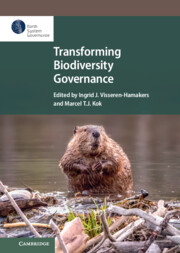Transforming Biodiversity Governance
Over fifty years of global conservation has failed to bend the curve of biodiversity loss, so we need to transform the ways we govern biodiversity. The UN Convention on Biological Diversity aims to develop and implement a transformative framework for the coming decades. However, the question of what transformative biodiversity governance entails and how it can be implemented is complex. This book argues that transformative biodiversity governance means prioritizing ecocentric, compassionate and just sustainable development. This involves implementing five governance approaches – integrative, inclusive, adaptive, transdisciplinary and anticipatory governance – in conjunction and focused on the underlying causes of biodiversity loss and unsustainability. Transforming Biodiversity Governance is an invaluable source for academics, policy makers and practitioners working in biodiversity and sustainability governance. This is one of a series of publications associated with the Earth System Governance Project. For more publications, see www.cambridge.org/earth-system-governance. This title is also available as Open Access on Cambridge Core.
Ingrid J. Visseren-Hamakers serves as Professor and Chair of the Environmental Governance and Politics (EGP) group at Radboud University, Netherlands, and specializes in transformative global environmental governance. She aims to contribute to both academic and societal debates on how societies and economies can become sustainable. Her research focuses on governing the relationships between animal interests, biodiversity and food, among others.
Marcel T. J. Kok is Programme Leader of the International Biodiversity Policy group at PBL Netherlands Environmental Assessment Agency. His research concentrates on global environmental governance and scenario analysis of global environmental problems, with a focus on biodiversity. He specializes in bottom-up governance approaches.

